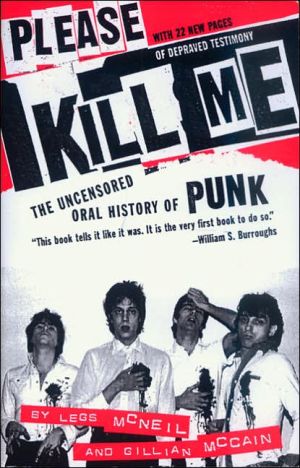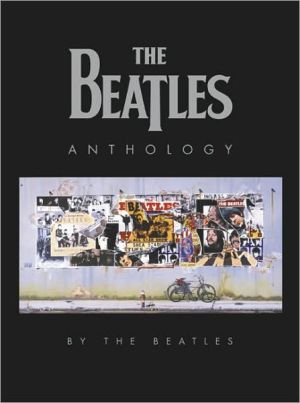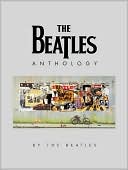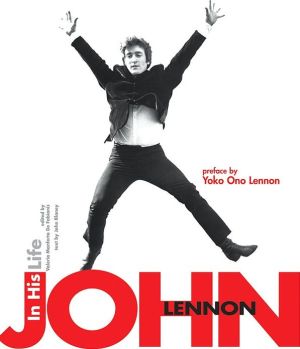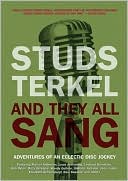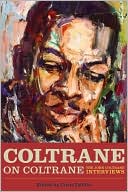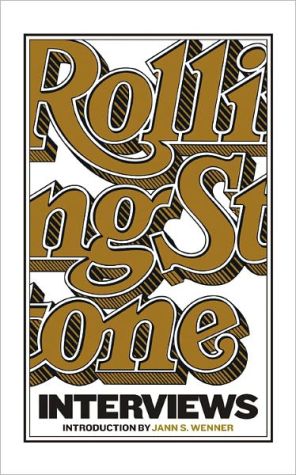Please Kill Me: The Uncensored Oral History of Punk
Please Kill Me: The Uncensored Oral History of Punk is the one story about the 1970s and the Blank Generation that has never before been told. Chronicling the birth of what we now call punk, from Andy Warhol's Factory to Max's Kansas City and CBGB's in the 1960s and 1970s, and on to the UK in the 1980s, authors Legs McNeil and Gillian McCain deliver the explosive story of America's most misunderstood pop phenomenon. Seamlessly constructed from a chorus of voices, Please Kill Me is oral...
Search in google:
A Time Out and Daily News Top Ten Book of the Year upon its initial release, Please Kill Me is the first oral history of the most nihilist of all pop movements. Iggy Pop, Danny Fields, Dee Dee and Joey Ramone, Malcom McLaren, Jim Carroll, and scores of other famous and infamous punk figures lend their voices to this definitive account of that outrageous, explosive era. From its origins in the twilight years of Andy Warhol’s New York reign to its last gasps as eighties corporate rock, the phenomenon known as punk is scrutinized, eulogized, and idealized by the people who were there and who made it happen. James Marcus In Please Kill Me, Legs McNeil and Gillian McCain track the rise and fall of American punk, from its late-'60s roots to its Reagan-era demise. We hear from all the usual suspects -- including John Cale, Iggy Pop, Patti Smith, Richard Hell and the Ramones -- as well as a vast constellation of fringe figures, who mostly document the sex lives and substance-abuse patterns of the stars. Not surprisingly, many of the participants are nostalgic for the golden age of 1975. But others, like Dee Dee Ramone, have long since exhausted their patience with "the little-boy look, the bowl haircut and the motorcycle jacket" (which McNeil himself seems to favor to this very day). By the end of the book it's hard not to share Dee Dee's feelings, and to wonder whether the authors haven't expended 100 pages too many on this particular cultural moment. Still, Please Kill Me often makes for hilarious reading. Its loony pile-up of detail does manage to catch the jolting energy of the period. And Danny Fields' description of the rapport between pre-punk titans Jim Morrison and Nico is worth the price of admission, even as it serves as a corrective to mythomaniacs like Oliver Stone: "They were both too poetic to say anything. It was a very boring, poetic, silent thing that was going on between them. They formed a mystical bond immediately -- I think Morrison pulled Nico's hair and then he proceeded to get extremely drunk and I fed him whatever was left of my drugs that Edie Sedgwick hadn't stolen." -- Salon
Please Kill Me\ The Uncensored Oral History of Punk \ \ By Legs McNeil Gillian McCain \ Grove Press\ Copyright © 1996 Legs McNeil and Gillian McCain\ All right reserved.\ ISBN: 0-8021-4264-8 \ \ \ Chapter One\ Poetry? You Call This Poetry?\ Danny Fields: When I wasn't getting laid elsewhere l went to Max's Kansas City every night. It was a bar and restaurant two blocks away from where I lived and you could sit there all night and bring yourself coffee. It was free. And you always signed the check and never paid the bill. I felt so guilty, I had an unpaid bill of about two or three thousand dollars. I guess that was a lot in the sixties. I had friends that would sign the check "Donald Duck" and "Fatty Arbuckle." It was just so wonderful and all the waitresses were beautiful ... and all the busboys ...\ You could have sex with all the busboys. I mean, not right there, but later. And anybody who walked into the room, you could luck, because they all wanted to be in the back room. And you would say, "You'll have to luck me and I'll let you sit at a good table."\ So it was wide open, but it wasn't gay, thank god. We hated gay bars. Gay bars? Oh please, who wanted to go to gay bars? At Max's you could fuck anyone in the room, and that was what was sweet about it.\ Leee Childers: Danny was the company freak at Elektra Records. His job was to keep the stupid record company executives somehow in touch with the street. That was an actual job title then: "company freak."He told them what was good and what wasn't, but mostly what was cool.\ The record companies were wise to actually admit that they weren't cool. In the sixties, they had to admit they didn't have a clue. So they hired people whose job it was to be cool. It was a wonderful idea.\ Danny Fields: They hired someone at a low level who wore bell-bottoms and smoked dope and took LSD in the office-me. And I really would take LSD in the office. I would sit around and just lick it. My hands would be all orange.\ Steve Harris: I was working for Elektra Records and was in California with Jac Holzman, the president of Elektra, when he went to see the Doors at the Whiskey for the first time. He came back and said, "I saw a really interesting group and I think I'm gonna sign them." And he did. Then they came to New York to do a show at Ondine's, on Fifty-eighth Street, under the bridge.\ Danny Fields: I remember Morrison did "Light My Fire" that night, because it was the only good song that he did.\ Tom Baker: I sat with Andy Warhol and his entourage at a long table near the stage. Pam Courson, Morrison's girlfriend, sat alongside me and was very excited. She said to me, "Jim's really up for tonight's show. Forget that shit at Gazzari's, now you're going to see the real Jim Morrison."\ When I saw them at Gazzari's, the club on Sunset Strip, Jim was high on LSD and staggering drunk. His performance was unspectacular, except for one moment-while stumbling through a song early in the set, he suddenly let out with a deep-throated, bloodcurdling scream. Pam was furious with him and kept telling me I wasn't seeing him at his best. I told her he was a good guy, but he should keep his day job.\ But when he finished the show at Ondine's, I sat there stunned. I looked over at Pamela. She leaned toward me and said, "I told you so."\ Afterwards, the Doors gave a party in a club to celebrate their success. When it was over, Jim and I stood talking at the bottom of the stairs that led up to Forty-sixth Street. It was late, and the area was full of various cops and creeps. Suddenly, Morrison started throwing empty glasses up the stairs.\ I grabbed him by the arm and yelled, "What the fuck are you doing, for Christ's sake?"\ He ignored me and threw another glass up the stairs, simultaneously letting out one of his bloodcurdling screams. I expected a small army of cops to come charging down. After one final glass and one final scream, Jim turned and was gone. I was frustrated because I wanted to tell him that finally I had met someone who was truly possessed.\ Danny Fields: The next day I had to go to the record company, so I told them there was this song about fire, and, "If you're putting out a Doors single, put that one out."\ They said, "Uh uh, it's too long."\ Then other people started to tell them to do that. At first they thought it was impossible, but after deejays reported back to them that they had a potential hit here, without that pretentious nonsense in the middle, they started to listen. It was a catchy tune.\ So they sent Paul Rothchild into the studio and said, "Paul, cut it." And Paul did. You can hear the separation in the middle. And it worked. It went to number one.\ Steve Harris: I think Danny had problems with Jim Morrison because Danny thought he could lead Jim around. They had a falling out at the Castle in California, when Jim was fooling around with Nico. They were hanging around in the Castle and Jim was very drunk, and very high, and Danny was afraid that he would die if he drove. So Danny took the keys to Jim's car. And Jim got really pissed at Danny for that.\ Danny Fields: I was in L.A. staying at the Castle with Edie Sedgwick and Nico, who were in Hollywood for some reason that I can't remember. The Castle was this two-story house, owned by some old Hollywood queen who rented it out to rock bands. Everyone had stayed there-Dylan, the Jefferson Airplane, the Velvets. The owner would rent it out to rock & roll bands because it was in such a state of ruin that it didn't really matter what happened to it.\ Just before I arrived in L.A., I was in San Francisco to see the Doors play at the Winterland. After the show I'd gone backstage and Morrison was surrounded by very slovenly and ugly groupies. I thought that was bad for his image. So I decided to fix Morrison up with Nico. It was a shiddach, which is Yiddish for a fix-up. I wanted him to meet Nico so that he would fall in love with her and see what kind of girl he should hang out with. I mean, it was a lot of nerve on my part. It was really none of my business to meddle in, but ...\ I've never had any respect for Oliver Stone, but after seeing his version of the Morrison/Nico meeting in the Doors movie-"Hello, I am Nico, would you like to go to bed with me?"-the reality of it couldn't have been more different.\ What really happened was that I met Morrison at the Elektra office in Los Angeles and he followed me back to the Castle in his rented car. Morrison walked into the kitchen and Nico was there and they stood and circled each other.\ Then they stared at the floor and didn't say a word to each other. They were both too poetic to say anything. It was a very boring, poetic, silent thing that was going on between them. They formed a mystical bond immediately-I think Morrison pulled Nico's hair and then he proceeded to get extremely drunk and I fed him whatever was left of my drugs that Edie Sedgwick hadn't stolen.\ In those days, I never traveled without my little supply of everything. My father was a doctor, so I had access to reds, yellows, blacks, Tuinals-everything. But since I had lived with Edie in New York, I knew she was a kleptomaniac of extraordinary skill, especially when it came to drugs. Edie just had a bloodhound's nose for prescription drugs. So the minute I got to the Castle, when I knew Edie's back was turned-she was kissing Dino Valenti good-bye in the driveway-I'd snuck upstairs and hid my drugs carefully in what I thought was a safe place, under a double mattress in a back bedroom.\ When I went back to them later, sure enough, they were decimated. Edie had found them. So I took what was left, some acid, and gave it to Morrison, and he got so stoned and so horrendously drunk that he wanted to drive away.\ So I took the keys out of his ignition and hid them under the mat of his car. I was afraid he would drive drunk and you know, go off a cliff and kill himself, and I'd be fired from Elektra. I was there on Elektra's money and it wouldn't be seemly to lose the lead singer on account of the publicist getting him so stoned, so I kidnapped him.\ There was no phone in the Castle. He couldn't get outta there. Morrison knew that I had taken the keys, but he was so stoned ... finally I went to bed.\ While I was sleeping, Nico came into my room, crying, "Oh, he's going to kill me! Oh, he's going to kill me!"\ I said, "Oh, leave me alone, Nico! I'm trying to sleep!"\ She was. sobbing, "Whoo hoo hoo." She went back outside, and then I heard her screaming. I looked through the window into the courtyard, and Morrison was just pulling her hair, so I went back to bed. Then David Numan, who was also staying at the Castle, came running into my room and said, "You'd better check this out."\ So I got up again and Nico was out in the driveway, still sobbing, while Morrison was naked in the moonlight, climbing around the rooftop. He was jumping from one turret to the other, while Nico sobbed.\ I went back to sleep, and that was the affair-he pulled her hair, he walked naked, she screamed, and I kept his car keys hidden for a day or two until he straightened up.\ And of course he hated me from that moment on for kidnapping him.\ Nico: I argued with Jim. He asked if I would walk along the edge of the Castle. I said to him, "Why?" and he couldn't answer.\ It was not a positive act, and not a destructive act; it didn't change anything. So why should I do something that is so vain, just to follow him? It was not spiritual or philosophical. It was a drunk man displaying himself.\ Ronnie Cutrone: I loved Jim Morrison dearly, but Jim was not fun to go out with. I hung out with him every night for just about a year, and Jim would go out, lean up against the bar, order eight screwdrivers, put down six Tuinals on the bar, drink two or three screwdrivers, take two Tuinals, then he'd have to pee, but he couldn't leave the other five screwdrivers, so he'd take his dick out and pee, and some girl would come up and blow his dick, and then he'd finish the other five screwdrivers and then he'd finish up the other four Tuinals, and then he'd pee in his pants, and then Eric Emerson and I would take him home.\ That was a typical night out with Jim. But when he was on acid, then Jim was really fun and great. But most of the time he was just a lush pill head.\ Ray Manzarek: Jim was a shaman.\ Danny Fields: Jim Morrison was a callous asshole, an abusive, mean person. I took Morrison to Max's and he was a monster, a prick. And his poetry sucked. He demeaned rock & roll as literature. Sophomoric bullshit babble. Maybe one or two good images\ Patti Smith was a poet. I think she elevated rock & roll to literature. Bob Dylan elevated it. Morrison's wasn't poetry. It was garbage disguised as teenybopper. It was good rock & roll for thirteen-year-olds. Or eleven-year-olds.\ As a person, I think Morrison's magic and power went beyond the quality of his versifying. He was bigger than that. He was sexier than his poetry-more mysterious, more problematic, more difficult, more charismatic as a performer. There has got to be a reason why women like Nico and Gloria Stavers, the editor of 16 magazine, fell so deeply in love with him, because he was essentially an abusive man to women.\ But it sure wasn't his poetry. I've got to tell you, it wasn't his poetry. He had a big dick. That was probably it.\ Gerard Malanga: I was walking down Eighth Street and I heard these two girls behind me say, "Isn't that Jim Morrison?" Ha ha ha. I felt like saying, "No, my jaw is a bit more angular." I felt a little eclipsed but I didn't give a shit, really.\ Danny Fields: The ultimate rock star is a child. How can you not be spoiled by everything that's going to come along? For most rock stars, what's in store for them, realistically, is a lot of spoilage, denting and banging around, exploitation, being used up, and ruination.\ And what happens if you get fat like Jim Morrison? You don't look cute in those clothes anymore.\ Jim Morrison really had it on his first trip here, which was the winter of 1966. Even when the first album was released in 1967, he looked wonderful. That's when he was at his best. He became a teen idol about a year later and then started putting on weight. His genes had an unfortunate tendency to send all the weight to his cheeks, so his eyes, which were never his best feature, disappeared.\ Then he grew a beard and became fat and drunk and sloppy.\ So my thinking was, Bring me another one. Bring me that one's head on a plate. Bring me a new one.\ Chapter Two\ The World's Forgotten Boys\ Ron Asheton: My younger brother, Scotty, and our neighbor Dave Alexander were stone punks. I was just the weird guy. In school, I was either the complete oddball, the herd, or the freak, and then they always called me "the Fat Beatle" when I used to wear Beatle suits on dress-up day.\ I didn't have a lot of friends. I was mostly into Nazi stuff. I took German class and did Hitler speeches. I'd wear SS pins to school, draw swastikas all over my books, draw Hitler mustaches on everyone's pictures, and draw little SS bolts on my arm. So I wasn't so much a stone-punk-kinda-hoodlum-guy as Scotty and Dave.\ We just didn't fit in. I remember one year we all tried to go back to high school on the first day. I made bets with Scotty and Dave about how long they were gonna last. I said, "Dave, you'll probably make it three hours, and Scotty, you'll probably make it half the day, and I'll probably make a whole day."\ Dave turned to me, he had a sixty-ounce-a big can of Colt 45 in his hand. He already had drank two of them, it was like nine in the morning, and he said, "You lost. I'm leaving now."\ Scotty wanted to get thrown out, so he went up to some kid at his locker, grabbed him by the back of the arms, and squeezed and twisted him with a pair of needle-nose pliers. So the kid runs down to the office, and we heard over the PA, "Scott Asheton come to the office!" He went down and got thrown out.\ Iggy Pop: These guys were the laziest, delinquent sort of pig slobs ever born. Really spoiled rotten and babied by their mothers. Scotty Asheton-he was the juvenile delinquent. His dad had died, his and Ron's, so they didn't have much discipline at home ... I mean, Dave Alexander and Ron Asheton had skipped school and gone to Liverpool, to be near the Beatles.\ Ron Asheton: Me and Dave Alexander were supergeeked on bands. We were always sitting around listening to records and talking about the Beatles or the Stones.\ We even had a band-well, sort of a band. We were called the Dirty Shames. We would play along to records and say, "We're great!" Then we'd take the record off and say, "Whaaa? Hey, maybe this isn't sounding too good."\ We built up the reputation that we were a great band, because we never played. We were actually called down to Discount Records one time, to meet this guy who was promoting the first Rolling Stones show at the Olympia Stadium in Detroit. He wanted the Dirty Shames to open for the Stones. We were all excited, until we realized, Wow, we can't even play! So we told the guy, "I think we're going to be auditioning out in L.A."\ A little while after that Dave tells me, "Hey, I'm going to England, you wanna go?" So I sold my motorcycle. I had a Honda 305 that I got instead of getting a car, when I got my driver's license. So we sold the bike and flew to England.\ We went to see the Who at the Cavern. It was wall to fucking wall of people. We muscled through to about ten feet from the stage, and Townshend started smashing his twelve-string Rickenbacker.\ It was my first experience of total pandemonium. It was like a dog pile of people, just trying to grab pieces of Townshend's guitar, and people were scrambling to dive up onstage and he'd swing the guitar at their heads. The audience weren't cheering; it was more like animal noises, howling. The whole room turned really primitive-like a pack of starving animals that hadn't eaten in a week and somebody throws out a piece of meat. I was afraid. For me it wasn't fun, but it was mesmerizing. It was like, "The plane's burning, the ship's sinking, so let's crush each other." Never had I seen people driven so nuts-that music could drive people to such dangerous extremes. That's when I realized, This is definitely what I wanna do.\ When Dave and I got home we got kicked out of school because we had superlong hair. I'd also grown the giant sideburns. I had knee-high Beatle boots-the big leather kind with the big Cuban heels-a leather vest, and a turtleneck. The counselor completely freaked and said, "This won't do!" So I said, "Fuck it," and started hanging out in front of Discount Records, where Iggy worked inside.\ (Continues...)\ \ \ \ \ Excerpted from Please Kill Me by Legs McNeil Gillian McCain Copyright © 1996 by Legs McNeil and Gillian McCain. Excerpted by permission.\ All rights reserved. No part of this excerpt may be reproduced or reprinted without permission in writing from the publisher.\ Excerpts are provided by Dial-A-Book Inc. solely for the personal use of visitors to this web site. \ \
\ From the Publisher“Ranks up there with the great rock & roll books of all time.” Time Out New York\ “This book tells it like it was. It is the very first book to do so.” William S. Burroughs\ “Does for the Ramones what the disciples did for Jesus.” —LA Weekly\ “Dishes the crud on everyone . . . candid, inside, and detailed.” —The New Yorker\ “Lurid, insolent, disorderly, funny, sometimes gross, sometimes mean and occasionally touching.” —The New York Times\ “The riotously funny story of New York punk told by those who were there.” —Daily News\ \ \ \ \ \ James MarcusIn Please Kill Me, Legs McNeil and Gillian McCain track the rise and fall of American punk, from its late-'60s roots to its Reagan-era demise. We hear from all the usual suspects -- including John Cale, Iggy Pop, Patti Smith, Richard Hell and the Ramones -- as well as a vast constellation of fringe figures, who mostly document the sex lives and substance-abuse patterns of the stars.\ Not surprisingly, many of the participants are nostalgic for the golden age of 1975. But others, like Dee Dee Ramone, have long since exhausted their patience with "the little-boy look, the bowl haircut and the motorcycle jacket" (which McNeil himself seems to favor to this very day). By the end of the book it's hard not to share Dee Dee's feelings, and to wonder whether the authors haven't expended 100 pages too many on this particular cultural moment.\ Still, Please Kill Me often makes for hilarious reading. Its loony pile-up of detail does manage to catch the jolting energy of the period. And Danny Fields' description of the rapport between pre-punk titans Jim Morrison and Nico is worth the price of admission, even as it serves as a corrective to mythomaniacs like Oliver Stone: "They were both too poetic to say anything. It was a very boring, poetic, silent thing that was going on between them. They formed a mystical bond immediately -- I think Morrison pulled Nico's hair and then he proceeded to get extremely drunk and I fed him whatever was left of my drugs that Edie Sedgwick hadn't stolen." -- Salon\ \ \ \ Publishers WeeklyAs its sensationalist title suggests, this stresses the sex, drugs, morbidity and celebrity culture of punk at the expense of the music. Starting out with the electroshock therapy Lou Reed received as a teenager, working through such watersheds as the untimely deaths by overdose or mishap of Sid Vicious, Johnny Thunders and Nico, as well as the complicated sexual escapades of the likes of Dee Dee Ramone, the portrayal here of the birth of an alternative culture is intermittently entertaining and often depressing. McNeil, one of the founding writers of the original 'zine, Punk, in 1975 , is certainly qualified to tell this tale. But the book's take on punk rock as "doing anything that's gonna offend a grown-up" overemphasizes the self-destructive side of the movement. Details of Iggy Pop's drug abuse and seedy sex with groupies receive more attention than important bands such as Television and Blondie, which had comparatively puritan lifestyles. Constructed as an oral history, the book weaves together personal accounts by the crucial players in the scene, many of whom seem to have been so drugged out most of the time that their reliability is questionable. McNeil and McCain (Tilt) provide a vivid look at the volatile and needy personalities who created punk, if they do not offer perceptive musical or cultural analysis. Photos. (July)\ \ \ \ \ Library JournalImagine one of those on-line "chat rooms" filled with the aging movers and shakers of American punk rock-former members of the Velvet Underground, the Stooges, the New York Dolls, the Ramones, and others-as well as assorted hangers-on, all reminiscing about the glory days of punk. Denizens remember when downtown Manhattan was the epicenter of a musical and cultural earthquake whose aftershocks are still felt long after its initial impact. The stories told by these musicians and scenesters trace the history of punk from its earliest incarnations in the late Sixties, through its appropriation by British imitators in the Seventies, and ending just before its stylistic balkanization and quick decline in the early Eighties. Unfortunately, this oral history depends almost entirely on voices from Detroit and a small core of New York bands, ignoring the important scenes in Los Angeles, Boston, and Cleveland. Numerous behind-the-scenes anecdotes make this book undeniably fun reading. But the lack of any index, bibliography, discography, or overarching narrative context keeps it from being much more than that. Not an essential purchase, but worth considering for larger collections. (Photos not seen.)-Rick Anderson, Penacook, N.H.\ \ \ \ \ Kirkus ReviewsPunk's chaotic energy and revolutionary spirit come through vividly in this mesmerizing account of American punk.\ For instance, Kathy Asheton notes, "I remember the day of his [Iggy Pop's] wedding because that was the day Iggy and I started our romantic relationship." Legions of groupies and other American punk scene denizens are similarly heard from here, as are central figures, including Iggy, Richard Hell, Malcolm McLaren, and members of the Velvet Underground, the Patti Smith Group, et al. During the heyday of hippiedom, the Velvets, the Stooges, and the MC5 distinguished themselves by their refusal to have any part of the peace-and-love agenda. Their unromanticized visions of boredom, violence, drug use, and weird sex had little commercial appeal. But the Velvets' Lou Reed and especially the Stooges' drug-crazed Iggy Pop became icons for a generation of disaffected kids who identified with the impulse to roll around shirtless in broken glass while howling "I Wanna Be Your Dog." In the early '70s the New York Dolls continued the tradition, combining goofy glamour and short, fast songs; the overdose death of the Dolls' first drummer cemented narcotics abuse as a central feature of the punk life. Authors McNeil, one of Punk magazine's founders, and McCain, a former promoter of downtown New York poetry readings, definitively assert punk's all-American origins; British impresario Malcolm McLaren tells here how he molded the Sex Pistols after patterns set by the Dolls and Richard Hell. Despite the astonishing prevalence of drug addiction, the New York bands and scene-makers of the mid-'70s, led by the Ramones, had splendid instincts for music and style, and most subsequent pop culture is to some degree indebted to them.\ An essential accompaniment to the first, still-thrilling punk records, this preposterously entertaining document just reeks with all the brilliance and filth of the Blank Generation.\ \ \
